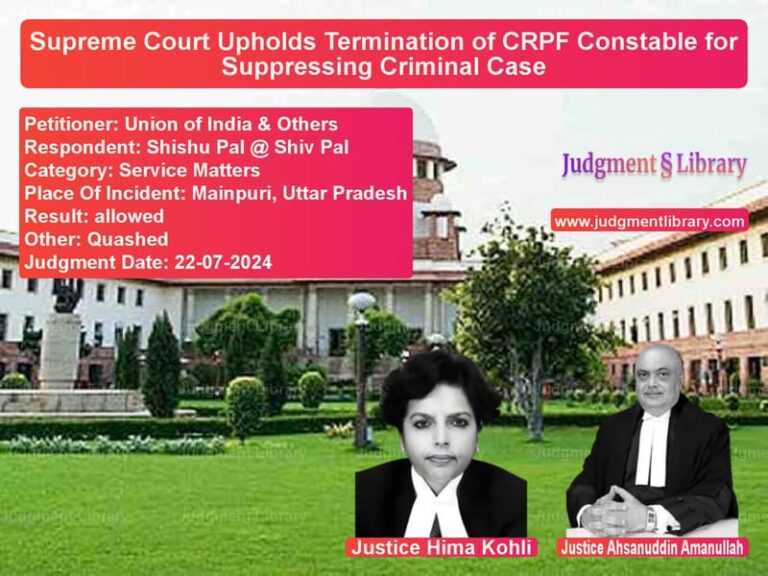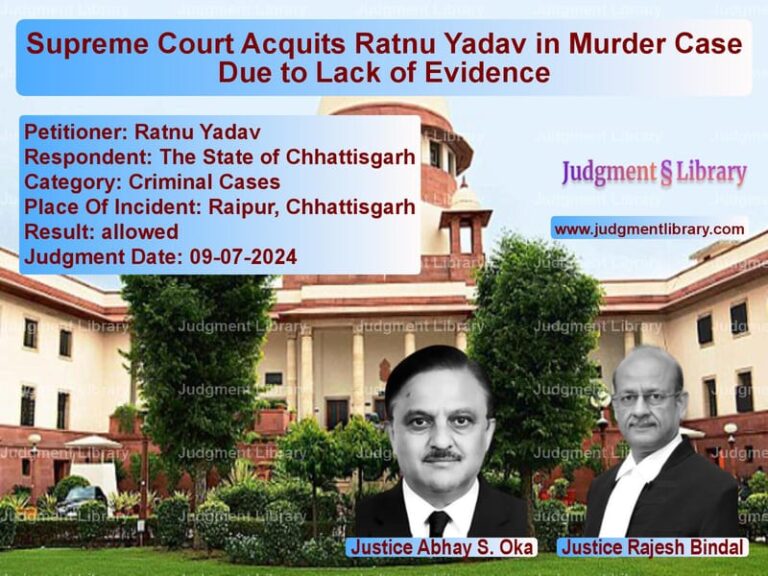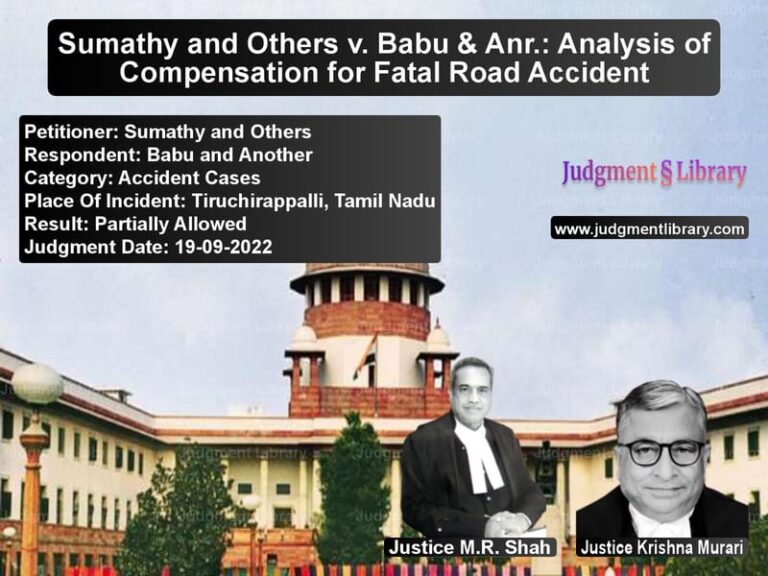Supreme Court Grants Bail to Convict in Pending Murder Appeal After 11 Years in Jail
The case of Shrikant Mishra vs. The State of Uttar Pradesh was a crucial ruling concerning the prolonged incarceration of an appellant whose appeal against a murder conviction had been pending before the Allahabad High Court for years. The Supreme Court had to determine whether the appellant should be granted bail while awaiting the final decision in his criminal appeal.
The appeal arose from a conviction under Section 302/34 of the Indian Penal Code (IPC) by the Additional Sessions Judge, Gonda, Uttar Pradesh. The appellant, Shrikant Mishra, was sentenced to life imprisonment for his alleged involvement in a murder. However, due to severe delays in the judicial process, his appeal had been pending before the High Court for more than a decade.
Background of the Case
The appellant was convicted and sentenced to life imprisonment in a murder case. Since his conviction, he had been in jail for over 11 years, awaiting a final decision on his appeal before the Allahabad High Court, Lucknow Bench.
When the appeal came before the Supreme Court, the judges directed the production of a Custody Certificate to verify the time the appellant had already served in jail. The certificate confirmed that he had completed over 11 years of his actual sentence, with additional time counted under remission.
Due to the extended delay in hearing the appeal, the Supreme Court considered whether it was justifiable to allow the appellant to remain in jail indefinitely while waiting for his appeal to be resolved.
Arguments by the Petitioner (Shrikant Mishra)
- The appellant had been in jail for over 11 years without any final resolution of his appeal.
- The appeal had not been taken up for hearing in the High Court despite multiple petitions.
- Prolonged incarceration without a final adjudication violated the appellant’s fundamental rights.
- Since he had already served a significant portion of his sentence, he should be released on bail pending the outcome of his appeal.
Arguments by the Respondent (State of Uttar Pradesh)
- The appellant was convicted for a serious offense under Section 302/34 IPC, which carries a life sentence.
- Granting bail in a murder conviction could set a precedent that weakens the deterrent effect of life imprisonment.
- The state argued that releasing the appellant might pose a threat to public safety and undermine the rule of law.
Supreme Court’s Judgment
After reviewing the arguments, the Supreme Court decided in favor of granting bail to the appellant. The key rulings of the Court were:
- The appellant had already served more than 11 years of his sentence, which was a significant portion of the life imprisonment term.
- The delay in disposing of the appeal was a factor that could not be ignored, and the appellant should not be kept in jail indefinitely.
- “Since the appeal is yet to be taken up for final hearing before the High Court, we are of the view that during the pendency of the appeal before the High Court, the appellant be released on bail, subject to such rigorous conditions as may be fixed by the trial court.”
- The trial court was given discretion to impose stringent bail conditions to ensure the appellant’s availability for future proceedings.
- The bail order would not apply if the appellant was required to be detained in any other pending case.
The Court observed:
“Be that as it may, since the appeal is yet to be taken up for final hearing before the High Court, we are of the view that during the pendency of the appeal before the High Court, the appellant be released on bail, subject to such rigorous conditions as may be fixed by the trial court.”
Implementation of the Judgment
The Supreme Court directed the following steps for implementing its order:
- The trial court was to determine strict bail conditions for the appellant.
- The appellant was to be released on bail unless he was required to remain in custody for any other pending case.
- The High Court was encouraged to expedite the hearing of the appellant’s appeal.
Significance of the Judgment
This judgment highlights the importance of ensuring a fair and timely judicial process. The Supreme Court recognized that the delay in disposing of criminal appeals should not result in indefinite incarceration without a final decision.
The ruling also sets a precedent for cases where appeals remain pending for extended periods, reinforcing that prolonged detention without resolution is inconsistent with the principles of justice. This judgment reaffirms that courts must balance public safety concerns with the rights of the accused.
Conclusion
The Supreme Court’s decision in this case ensures that appellants do not remain in jail indefinitely due to judicial delays. By granting bail while awaiting appeal resolution, the Court reaffirmed the principle that justice delayed is justice denied.
This ruling serves as a significant precedent in criminal law, emphasizing the need for timely resolution of appeals and judicial sensitivity to prolonged incarceration. The Supreme Court’s intervention ensures fairness while maintaining the integrity of the judicial process.
Petitioner Name: Shrikant Mishra.Respondent Name: The State of Uttar Pradesh.Judgment By: Justice Kurian Joseph, Justice Deepak Gupta, Justice Hemant Gupta.Place Of Incident: Gonda, Uttar Pradesh.Judgment Date: 20-11-2018.
Don’t miss out on the full details! Download the complete judgment in PDF format below and gain valuable insights instantly!
Download Judgment: Shrikant Mishra vs The State of Uttar P Supreme Court of India Judgment Dated 20-11-2018.pdf
Direct Downlaod Judgment: Direct downlaod this Judgment
See all petitions in Bail and Anticipatory Bail
See all petitions in Murder Cases
See all petitions in Custodial Deaths and Police Misconduct
See all petitions in Judgment by Kurian Joseph
See all petitions in Judgment by Deepak Gupta
See all petitions in Judgment by Hemant Gupta
See all petitions in allowed
See all petitions in Modified
See all petitions in supreme court of India judgments November 2018
See all petitions in 2018 judgments
See all posts in Criminal Cases Category
See all allowed petitions in Criminal Cases Category
See all Dismissed petitions in Criminal Cases Category
See all partially allowed petitions in Criminal Cases Category






